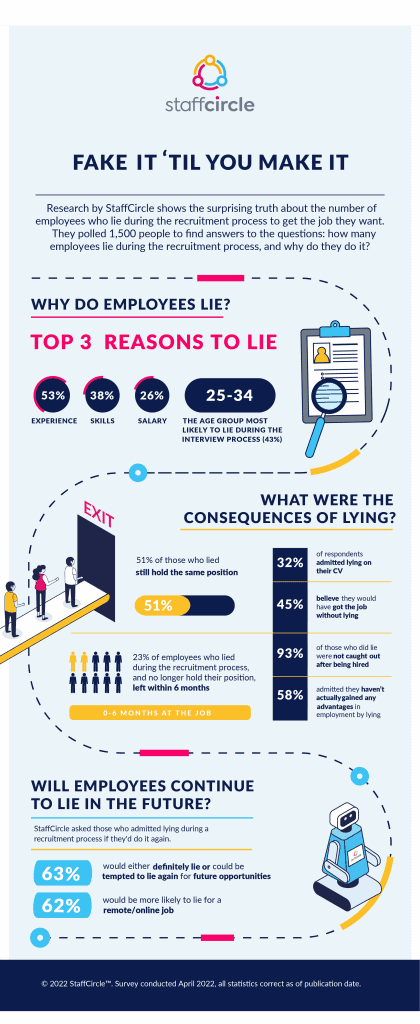Competition for jobs is tough in the current job market. Employers want to find the most talented candidates, and employees use every trick in the book to ensure they land the roles. The latest study from StaffCircle shows that 32% of the surveyed employees have gone as far as lying on their CVs or as part of the recruitment process.
According to the study, the top three demographics most prone to lying on their CVs were the
25-34 year-olds, 35-44 year-olds, and 18-24-year-olds, respectively.
Landing a job in the current economic climate is far from easy. Employers are asking for skills and work experience many young graduates might not yet have. Job application insecurity could leave candidates embellishing their past achievements.
The pressure to bend the truth doesn’t seem to be dying down. The survey showed that 63% of the respondents were ready to lie again in the future and that also over 62% would be more likely to lie to get a remote working role.
What are employees fabricating the truth about?
The most common aspects that employees were fabricating the truth about on their CVs aren’t a big surprise. The study showed the top three untruths to be:
- About work experience (51% of respondents)
- About skills (38% of respondents)
- About previous salary (26% of respondents)
Respondents weren’t only deceitful about getting the job offer they wanted. 18% out of 1,500 respondents said they had lied to switch careers. Career hopping is still a common occurrence these days.
Over 39% of people who have considered career changes have done so because they’ve been motivated by receiving a higher salary, with the average age being 39 when people change their careers.
What are the consequences of bending the truth?
Falsifying CV details didn’t seem to land the majority of people in trouble. 93% of those who admitted to lying didn’t get caught. Out of them, 40% still held the same job they had got with misinformation.
Employees also had mixed feelings about the benefits of telling untruths. 42% of the surveyed felt that lying probably helped them land a job. However, 58% said they didn’t think being untruthful helped them.
But you shouldn’t think fabricating things during the recruitment process is a good idea. 14 out of the 1,500 respondents had landed themselves in big trouble with their employers, resulting in legal action for fabricating the truth.
Companies can impose fines and dismiss employees under certain circumstances. Employees might even face further career trouble. Recruiters might share information with each other. Your ability to land a new role could be damaged for good if you decide to lie on your CV.
What can employers do about employees misrepresenting their abilities?
Bending the truth could hurt both employers and employees. Hiring the wrong candidate causes problems that hurt productivity and employee job satisfaction.
Spotting falsifications requires more care during the recruitment process. Companies could pick out false information about work experience with thorough background checks. Recruiters should ensure they use competency-based interview techniques to check candidates have the skills they say they do. Tools, such as performance management software for employees, can ensure their skills match the roles they hold once the hiring process is concluded.
Investment in the correct employee management and recruitment tools can help ease the pressure. For employees, it’s important to develop transferable skills and trust in their abilities. You can perform well in the job market without resorting to half-truths.
Catching liars won’t be easy, but it’s worth the effort. The vetting system needs to ensure fairness. Employees should also remember that lying is hardly ever worth it. Ending up in a job you’re not the right fit for could negatively impact your career growth.

